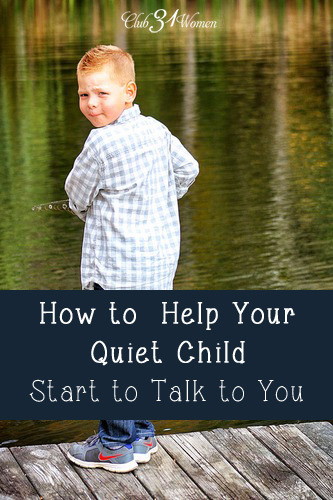How to Help Your Quiet Child Talk to You (& why it’s so critical to do so)
You wouldn’t have to know us long . . .
Before you concluded that we’re a family of talkers.
And it’s true. There’s little we enjoy more than a rousing conversation.
Unless perhaps it’s a cup of French press coffee.
But in spite of the fact that most of us are talkers, if you stuck around long enough, you’d observe a few who were less talkative than the others.
Oh, they might smile with their eyes or nod in agreement – or disagreement – but they don’t really say much.
These are my quiet children.
And I have a deep appreciation for their quiet spirits and silent ways.
But over the years? I’ve learned that there’s also a danger with our non-talkers.
Danger?
Yes, and I’ll tell you why.
While there’s nothing wrong with choosing to say less . . .
Choosing not to communicate can be harmful to your child.
It’s critical that your children tell you what they are thinking and feeling.
It’s critical that they are able to voice their struggles and concerns.
It’s critical that they learn to communicate for the sake of their family relationships, friendships, and future marriage.
So while I have no wish to change their personality, as their parent, it’s my responsibility to help them learn to communicate what’s on their heart and mind.
And if you have have a more reticent child, it’s your responsibility too.
How does a parent encourage a Quiet Child to start talking?
1. Set aside time. Your willingness to prioritize the time shows your child that you are serious about this and that it’s very important to you. A child is far less likely to open up if you’re always rushing around or on your way somewhere.
It takes both space and time to reach a quiet heart.
2. Ask questions. Your child might not be too eager to volunteer what is going on inside him or her, so why not begin with asking some basic questions?
How did that make you feel?
What have you been thinking about lately?
What is your favorite . . . (book, movie, food, etc) and why?
Do you ever feel afraid? What kinds of things make you fearful?
What did you like best about today? About that event?
What do you enjoy the most? What kinds of things make you feel happy inside?
3. Wait patiently. For their answers. Be willing to remain silent until they come up with something. If you have a really “tough” case, then maybe throw out some words or possible ideas to get them started – but only as a last resort.
4. Listen without judgment. Okay, so I know we’re the parents and I’m not suggesting you throw out discernment or wisdom. But try to resist the urge to pass judgment, to solve the problem, or generally sweep through and take over.
Instead, simply nod your head and express your interest in what they have to say. (Only later, if necessary, come in and and correct “wrong” thinking.)
5. Explain that communication is not an option. It is expected that each child of ours will learn the skill of communicating. Just as it is “not an option” to avoid eating with the family or helping out around the house, so it is with talking together. While it might be more difficult for some children than it is for others, it is still expected that they will participate and eventually grow in this area.
Now that some of our quieter children are older, they’ve been able to express how much they needed to open up and share their hearts. They see what a difference it makes – in both their relationships and their own inner peace – to be able to talk about their joys and struggles.
So if you happen to have a Quiet Child? Strike up a conversation and enjoy a good heart-to-heart.
You both will be very glad you did.
*What do you do to encourage your quiet child to open up? Or, if you were that “quiet child”, what helped you to communicate your thoughts and heart?
In His grace,
(This post may contain affiliate links. Read my full disclosure.)
 *Our books are now available: 100 Ways to Love Your Husband by Lisa Jacobson and 100 Ways to Love Your Wife
*Our books are now available: 100 Ways to Love Your Husband by Lisa Jacobson and 100 Ways to Love Your Wife by Matthew L. Jacobson
by Matthew L. Jacobson
If you would like these posts delivered directly to your inbox, simply subscribe below (and get the FREE eBook, The 7 Habits of a Highly Fulfilling Marriage).





